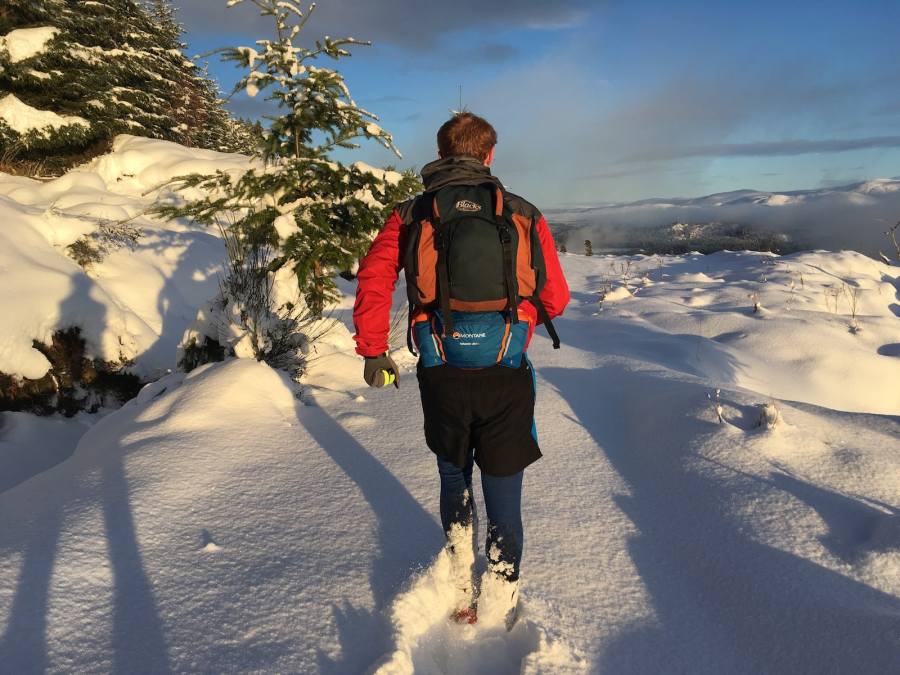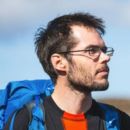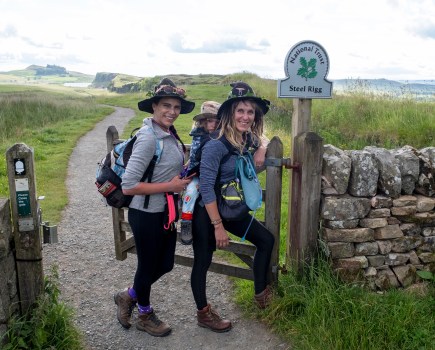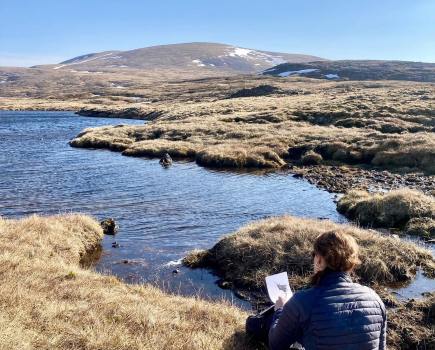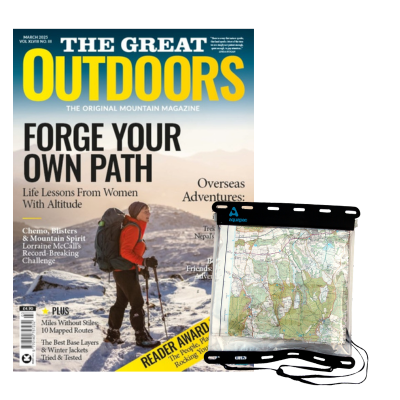Adam Boggon takes on a run with a difference along the Great Glen Way, probing both his physical and psychological limits – and discovers the joy of feefle
Other digital features by Adam Boggon
- Confusion in East Africa
- Saga of Magnus – an Orkney journey
- Down to the river – mucking about in boats in the Borders
- Snowbound
Snowbound
by Adam Boggon
The idea was to see if running could be like sitting in a chair. In a good chair one feels at ease, able to read, listen, plan. It’s not a perfect analogy – in movement, if you read you’re liable to fall down, spill your coffee – but some things transfer.
Morning in Inverness: I say goodbye to Brea the collie, sling on my backpack and run slowly to the hospital. I can listen to the news, look out to the firth, anticipate breakfast. I can steady the breath, feel calm and close to the earth. I wondered if I could take that same approach to a trail in mountains and stay sitting in my running chair for a long way. In winter. Perhaps through snow.
The Great Glen seemed a suitable venue. A popular long-distance walk sneaks up the north side of the deep tear in the landscape dividing the North-West Highlands from the Grampians. There would be hostels to stay in and a well-marked trail. At first I thought of running the whole 79 miles. I could take a few days. Then I remembered it was January and that the last time I tried multi-day trail marathons I couldn’t run after Day One and could barely stand after Day Three. Not at all like sitting in a chair.
I revised the plan to a two-day run: Invergarry to Inverness, 50 miles, achievable in a weekend given fair weather and motivated companions. Despite coaxing, the right sort of companions proved difficult to find. Even the promise of cozy bunkhouses and a steam room at the finish wasn’t enough for most. The excuses were many and varied: engagement parties, family illness, being in New Zealand.
The snow reached our mid-shins; fresh, light powder. The path was unbroken and we took it in turns to run ahead and break trail
The one exception was Megan Fileman. I’ve known her for a year or so and our friendship is based largely on empathising over relationship calamities and trying to restart my car. In the autumn she came up to Inverness to work in the obstetrics department. She liked being near the mountains, going to the little bicycle-themed cafe in town and Tuesday sessions with the Highland Hill Runners, but in the end Inverness wasn’t the place for her and she moved to Glasgow. Her parting shot to the Highlands: “People are from bloody miles away, aren’t they?”
Soon it was time for the journey. The Highlands had seen heavy snowfall for five days. The roads were open and the buses running but there was no knowing what conditions on the trail would be like.
Megan and I were joined by Charlie, a colleague who had decided to join at short notice. We were hesitant and wide-eyed as the bus took us into the night. The drive west did little to relieve Charlie’s apprehension: “You can’t even see the road!” But our bold Polish driver was not to be daunted by swerving or intermittent loss of traction, and within a couple of hours we were padding up the icy track to the hostel at Invergarry.
In the morning I asked Megan how she felt about the day ahead. Toothbrush lolling out of the corner of her mouth, she replied: “Fine. I’m worried my bag’s going to chafe though.”
“Have you run with it before?”
“Yeah.”
“Did it chafe then?”
“Yeah.”
I faffed nervously with my bags. I was excited to see the condition of the trail and the depth of the snow. I had no real sense whether running would be viable. If the snow was too deep to get into a rhythm, or the way covered in sheet ice, the journey would be off before it had begun.
I strapped on my running bum-bag, slung a small pack over my shoulders, pulled on a pom-pom hat and stepped into the -5°C morning.

We joined the trail as it wound steeply up the glen. The pine forest was dense, windless, the deep silence muffled further by the heavy layer of snow covering every surface. The trees were laden, limbs bowing earthward under the weight of the snow. The branches reminded me of Japanese winter prints in the British Museum and I recalled the cover of Bashō’s Narrow Road to the Deep North.
My mind spooled back to Mount Fuji. With my brother Daniel and our Scout group I climbed it overnight before catching a bullet train in the morning. Our hope had been to reach the summit for sunrise, and I had looked forward to reading a few verses from the book on the lip of the volcano. In the event, we hiked all night surrounded by the most ferocious rainstorm I’ve ever been in and could see nothing at the top but the swirl of the tempest. My copy of Bashō was destroyed by the downpour without ever leaving my bag. Not the journey we had expected or planned for, but unforgettable all the same.
My focus returned to the day ahead. The snow reached our mid-shins; fresh, light powder. The path was unbroken and we took it in turns to run ahead and break trail. The going was heavy yet somehow light. The top layer scattered before our churning legs. My stride seldom cleared the depth of the drift so a cascade of displaced snow rolled ahead of me like the bow wave of a small boat. It felt as if I were running through someone else’s dream.
The low, pale sun crept over the horizon. The way dropped from the woods to the side of a canal. The surface of the water was frozen and I imagined ice-skating along it all the way to Fort Augustus.
Skirlin, spitters, flicht, snaw-pouther, neester, driffle – the Historical Thesaurus of Scots records more than 400 words for snow. I especially like gramschoch (the conditions before a snowstorm) and flukra (a large snowflake). The word I needed though was feefle – the sound of moving snow. It is almost no sound at all, less than a rustle. By the canal the snow was thin with a crunchy, icy layer, but after Fort Augustus – where we failed to secure a cup of coffee or anywhere warm to sit down – we climbed back into the woods to deeper-lying drifts. The sun was bright and almost warm on our cheeks when it broke through clearings in the pine, the only sounds our breath and the infinitesimal muffling feefle. I wanted to hold on to that sound forever.
As I ran, my thoughts wandered; up tree trunks, into the animal footprints on the path, toward the prospect of lunch. They alighted on a half-remembered passage from a book called The Wayfinders:
In the mountains of Japan, outside of Kyoto, Tendai monks sleep for two hours a day and, with only a bowl of noodles and a rice ball for food, run through the sacred cryptomeria forests 17 hours at a stretch for 17 years, covering at one point in their kaihigyo initiation 80 kilometres a day for 100 days… Beneath their white robes they carry a knife and a rope. Slung from their back are rope sandals. They wear out five pairs in a day… all with the goal of revealing that everyone and everything are equal, that human beings are not exceptional, that nothing in the world is permanent.
I had picked up the book in Ljubljana when I was 19 and scribbled down the passage into a notebook. I’ve found it helpful from time to time to be reminded how superficial my occasional journeys toward self-annihilation are in comparison to those monks.
The progressive deterioration in my physical condition was accompanied by a sudden collapse of my psychological fabric
By the time we dropped out of the woods at Invermoriston, Charlie was himself well on the way to annihilation. He had prepared for a 30-mile run with an evening of squatting at the gym a few nights before. Now, 17 miles in, his discomfort had intensified.
We failed again to find anywhere to warm up, the hotel and cafe being closed and the owner of the one small shop declaring he had “better things to do that sit around all day watching youse” when we asked if we might sit on his floor.
Instead, we cut away a thick covering of snow from a bench outside and ate a few slices of bread. Charlie told us he couldn’t go any further and that he’d decided to wait for the next bus. We were sorry to lose him, but agreed that since the next leg to Drumnadrochit would take us away from the main road for 14 miles it would be unwise to head out again if he wasn’t sure he could make it.
For me and Megan the path wore on. The trail ran higher, only 400m or so above sea level but enough to mark a difference in the depth of snow. The extra resistance and effort required to cover ground began to tell. At mile 23 the path kicked up again steeply and I knew I was moving into Big Wall country. The running tracker in my pocket told me I’d used something north of 5,000 calories, with no allowance for the extra energy expended plowing through snow all day.
I was glad I’d brought my own snacks because our anticipated rest stops had yielded nothing except bad feelings toward the local proprietors. My little parcel of bread, butter and dried fruit did what it could, but ultimately the distance did to us what it was always going to.
The progressive deterioration in my physical condition was accompanied by a sudden collapse of my psychological fabric. Central nervous system fatigue and a degree of hypoglycaemia teed me up nicely for a further psychic thump.
I had been in contact that week with a friend who now lived in Canada. I missed her every so often – quietly, usually at the end of a long day, or when something especially good happens that I’d liked to have told her about. Now my sense of her being gone grabbed the sides of my skull and pressed hard. To shake loose from that unprepared-for shudder of longing, I plugged in my earphones for the only time that day and picked a story from the New Yorker. I chose what I hoped would be a life-affirming title, ‘My Father Addresses Me on the Facts of Old Age’ by Grace Paley. It was no such thing, and proved gloomy.
By the end I felt as bleak as I had for many months. Darkness bubbled up. My left knee gnawed painfully. I thought: “You’re an idiot. You’ve left Charlie shivering in the snow. What made you think this was a good idea anyway? Also, that running-as-chair thing is the stupidest thought you’ve ever let out of that hutch you have for a brain. It’s time for you to sit down. Now!”
I staggered to a halt. My knees trembling, I sagged into the snow. Is this what it feels like to die?
I reasoned with myself: “Come on, you’re being melodramatic. It’s just a wall. You’ve been here before. You know it can be passed through.”
I put on my jacket, rooted around for my bag of dates and mango, drained a bottle of water. I waited for Megan. Concern flickered across her face. I smiled and gave a theatrical run-down of my mental and physical disintegration. This gave me a sense of release and I remembered I’d come to the mountain path to run, not to make a fuss. I heaved my body out of the hole in the snow and got back to the task. At the top of this rise the path bent sharply and flattened out. The hillside fell away to the right and through the clear air I looked down the length of Loch Ness, the hills beyond that, and the perfection of blue sky above everything else. I felt new strength in my legs and a hardening of my resolve. It was the second wind. Fantastic!
I have learned that a single day can contain almost the whole of life
I checked my phone and was relieved to see that Charlie had made it to Inverness. My legs shuffled through the deep snow, aching knees hardly bending – it wasn’t dignified athleticism but there was a certain spirit, of something old in life which is hard to break. We left the woods and were on the road to Drumnadrochit as darkness fell. The soft snow trail behind us, the last of the day’s 30 miles would be on tarmac.
My left knee was really biting now. The scouts of soreness that had issued forth earlier in the day had ceded the field to great armies of pain. They roamed the scarred landscape of my body, victory almost complete. But the last of my stubbornness, knowing from the lights in the distance that the end was no longer far, held out in the last beleaguered keep. The final fastness of my fastness – the stout-hearted trot – held on until the end. Finally, almost unbelievably, we were among the street lights, then down the snowbound side-street, at the hostel door, inside the warmth of the bar. It was done. Which was just as well, because so were we.
Inside we met Nicola, the hostel owner who about 20 years earlier had babysat for my brothers and me. “You ran here? From Invergarry? Oh my.”
I gradually regained my sense of being a human. A shower, a cup of tea, fresh clothes. A few minutes laughing and lying flat on my back in the bed was a good start. A scalding hot shepherd’s pie and a big cake with almond and raspberry and custard in the Loch Ness Inn completed the metamorphosis from pack animal to young man. I was exhausted but glowing, vanquished but triumphant. Before going to sleep we decided we’d give the last 20 miles to Inverness a miss. If that meant failure we didn’t mind.
I have learned that a single day can contain almost the whole of life. A week later, sitting in the cinema watching advert after advert for cars I did not want and could not afford, I felt a sense of restiveness steal over me. I wanted to be moving through trees again. I wanted to be running through the snow, though the snow had melted now.
I knew then that movement itself is primal and primary. Its rhythm is like the beating of the heart, it rises and falls, but keeps going. Keeps going to the end.

